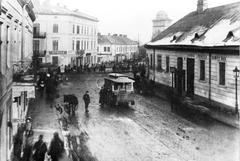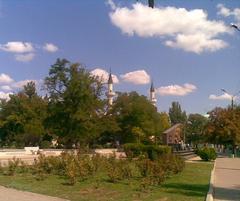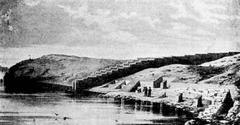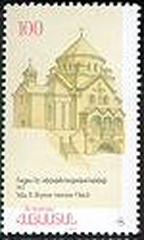Chapel Of Saint Nicholas The Wonderworker
Chapel of Saint Nicholas the Wonderworker: Visiting Hours, Tickets, and Historical Significance in Crimea
Date: 14/06/2025
Introduction
The Chapel of Saint Nicholas the Wonderworker in the Autonomous Republic of Crimea, Ukraine, is a remarkable monument blending spiritual devotion, maritime heritage, and cultural memory. Perched along the Black Sea coastline, the chapel honors Saint Nicholas—patron of sailors, travelers, and the needy—and serves as both a sanctuary for worship and a memorial for those lost at sea. Its unique architecture, commemorative significance, and role in local religious life make it a must-visit for pilgrims, history enthusiasts, and travelers interested in Crimea historical sites.
This comprehensive guide will provide you with essential information on the chapel’s history, architectural highlights, visiting hours, ticketing, accessibility, and tips for a meaningful visit.
Table of Contents
- Historical Background and the Cult of Saint Nicholas in Crimea
- Architectural and Artistic Features
- Visiting Hours, Ticket Details, and Accessibility
- Religious and Cultural Life
- The Water Disasters Museum
- Visitor Experience and Etiquette
- Nearby Historical Sites and Travel Tips
- Frequently Asked Questions (FAQ)
- Visual Gallery Suggestions
- Conclusion and Resources
Historical Background and the Cult of Saint Nicholas in Crimea
The veneration of Saint Nicholas, also known as Nicholas of Myra, is deeply rooted in Eastern European Christian tradition. The cult of Saint Nicholas spread through Crimea after the Christianization of Kyivan Rus in the 10th century, under Prince Volodymyr (Vladimir the Great), establishing the saint as a symbol of protection, compassion, and mercy throughout the region (St. Nicholas Center). The Black Sea’s perilous waters made Saint Nicholas especially revered among Crimean sailors and travelers.
The chapel’s current form in Malorechenskoye, completed in 2009 as part of the Memorial Complex “In Memory of the Dead on the Waters,” upholds this legacy. It commemorates not only the saint but also those who lost their lives at sea, integrating religious devotion with maritime remembrance (Crimean Travel Portal).
Architectural and Artistic Features
Exterior
- Lighthouse Design: The 66-meter white tower, resembling a lighthouse, stands as the tallest temple in Crimea. Its lighthouse-like silhouette symbolizes guidance and hope for seafarers.
- Maritime Motifs: The base and entrance feature stylized waves, anchors, dolphins, and ship prows, emphasizing the chapel’s maritime connection.
- Dome and Cross: A gilded dome topped with an Orthodox cross shines over the Black Sea, visible from miles away.
Interior
- Iconography: The chapel houses icons of Saint Nicholas, Our Lady of Kazan, Seraphim of Sarov, and Blessed Matrona of Moscow, crafted using an intricate macramé-collage technique with over 8 million knots.
- Frescoes and Mosaics: Walls and ceilings are adorned with scenes from Saint Nicholas’s life, his miracles—especially those at sea—and other Orthodox saints.
- Memorial Elements: The “Wall of Memory” lists the names of sunken submarines and lost crews. Maritime artifacts and dedications throughout the chapel and grounds reinforce its dual role as memorial and shrine (St. Nicholas Center).
Visiting Hours, Ticket Details, and Accessibility
- Visiting Hours: Open daily from 9:00 AM to 7:00 PM, with extended hours during major religious holidays (notably December 6 and May 22—Saint Nicholas’s feast days).
- Tickets: Entry is free. Donations are appreciated to support site maintenance and the museum.
- Guided Tours: Available by prior arrangement, offering deeper insight into the chapel’s history, architecture, and significance.
- Accessibility: The chapel is wheelchair accessible, with ramps, handrails, and designated parking. The interior and museum are suitable for visitors with mobility challenges (Crimean Travel Portal).
Religious and Cultural Life
The chapel remains a central place for worship, especially during feast days. On major holidays, special liturgies, memorial services, and candle-lighting ceremonies draw large gatherings of pilgrims, sailors, and families. The lighting of the chapel’s lamps on New Year’s Eve and Easter creates a powerful visual beacon for those at sea.
The local community celebrates Saint Nicholas’s legacy with acts of charity, gift-giving, and traditions rooted in Orthodox Christian practice (Visit Ukraine Today).
The Water Disasters Museum
Located on the ground floor, the Water Disasters Museum spans about 1,000 square meters and is designed like a sunken ship. It displays artifacts and exhibits related to maritime disasters, including the Titanic and the Russian submarine Kursk. The museum educates visitors on global maritime tragedies, highlighting the chapel’s role as a place of remembrance and reflection.
Visitor Experience and Etiquette
- Dress Code: Modest attire is required; men should avoid shorts and sleeveless shirts, women should cover shoulders and knees and wear a headscarf.
- Photography: Allowed in most areas, but avoid flash during services and be respectful of worshippers. Always ask permission before photographing clergy or participants.
- Behavior: Maintain a respectful silence during prayers, and follow the posted guidelines for visitors.
Nearby Historical Sites and Travel Tips
- Swallow’s Nest Castle: A neo-Gothic castle perched on a Black Sea cliff.
- Livadia Palace: Former summer residence of the Russian tsars.
- Nikitsky Botanical Garden: One of the oldest botanical gardens in the world.
- Holy Dormition Monastery (Bakhchisaray): A monastery carved into rock, offering guided tours (Crimean Travel Portal).
- Tauric Chersonese (Sevastopol): An ancient Greek colony and UNESCO World Heritage Site (Chersonese Museum).
Travel Tips:
- Use local buses or drive; parking is available.
- The best time to visit is during spring or early autumn for mild weather.
- Cash (Russian ruble) is preferred for donations and small purchases.
- Language: Russian and Ukrainian are common; English is limited.
Frequently Asked Questions (FAQ)
Q: What are the chapel’s visiting hours?
A: Daily from 9:00 AM to 7:00 PM, with possible extended hours on feast days.
Q: Is there an entrance fee?
A: No, entry is free, but donations are appreciated.
Q: Are guided tours available?
A: Yes, by prior arrangement—especially during holidays or for groups.
Q: Is the chapel accessible for people with disabilities?
A: Yes, the chapel and museum are wheelchair accessible.
Q: What other sites are nearby?
A: Swallow’s Nest, Livadia Palace, Nikitsky Botanical Garden, Holy Dormition Monastery, and Tauric Chersonese.
Visual Gallery Suggestions
- Exterior views of the chapel’s lighthouse tower, especially when illuminated.
- Close-ups of the unique macramé icons.
- Memorial plaques and maritime artifacts.
- Interior mosaics and frescoes depicting Saint Nicholas’s miracles.
- Panoramic views from the observation platform over the Black Sea.
Alt text should use terms like “Chapel of Saint Nicholas the Wonderworker visiting hours,” “Crimea historical sites,” and “Chapel of Saint Nicholas tickets” for SEO and accessibility.
Conclusion
The Chapel of Saint Nicholas the Wonderworker in Crimea is a profound symbol of faith, maritime history, and cultural memory. Its striking design, commemorative purpose, and welcoming atmosphere make it an essential destination for both spiritual reflection and cultural exploration. Whether attending a feast day, exploring the Water Disasters Museum, or visiting nearby landmarks, you will gain a meaningful connection to Crimea’s rich religious and historical heritage.
For the latest information on visiting hours, guided tours, and events, consult the Crimean Travel Portal and consider downloading the Audiala app for travel updates. Follow our social media channels for more stories and tips about Crimea’s most treasured sites.
References
- Chapel of Saint Nicholas in Crimea: Visiting Hours, History, and Cultural Significance (St. Nicholas Center)
- Visiting the Chapel of Saint Nicholas the Wonderworker in Crimea: Hours, Tickets, and Nearby Historical Sites (Crimean Travel Portal)
- Visiting the Chapel of Saint Nicholas the Wonderworker in Crimea: Architectural Marvel and Maritime Memorial (St. Nicholas Center)
- Saint Nicholas Day 2024: History of the Holiday and Traditions in Ukraine (Visit Ukraine Today)
- Chapel of Saint Nicholas the Wonderworker in Novosibirsk: History and Photo (Religion Mystic)
- Chersonese Museum
- St. Nicholas Orthodox Church



